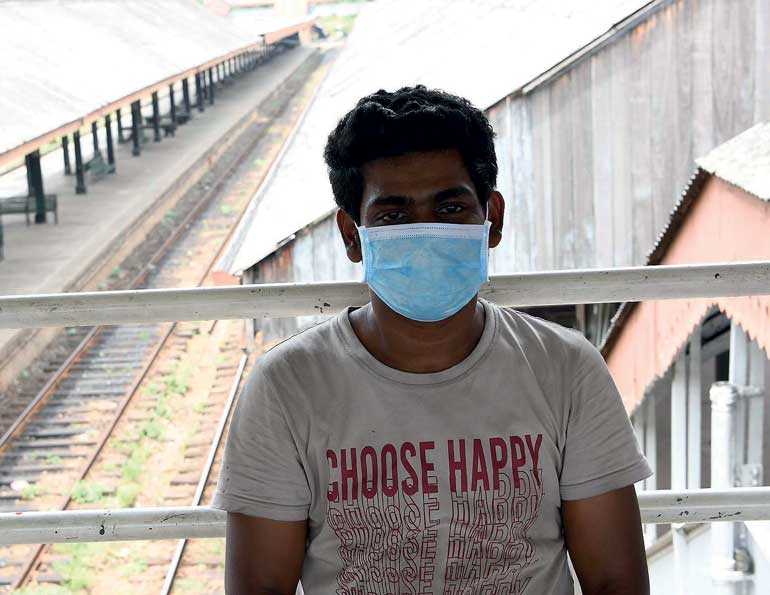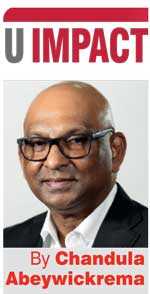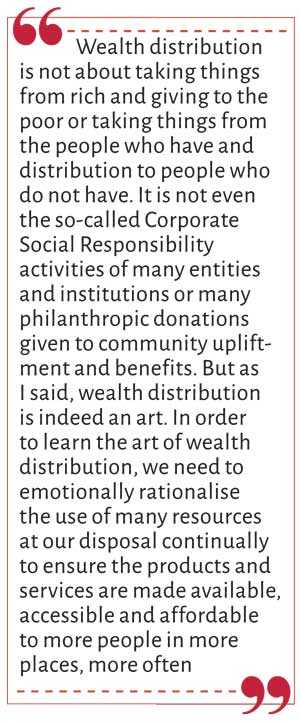Monday Feb 23, 2026
Monday Feb 23, 2026
Tuesday, 31 March 2020 00:00 - - {{hitsCtrl.values.hits}}

After the two world wars, this is the first time a dreadful global status is impacting every person on planet Earth – Pic by Shehan Gunasekara
There is now an equalising and balancing process going on in our little planet Earth. Air is getting cleaned from its manmade pollutions, birds and animals are safely and freely moving in their own wild space, and flower trees to big giant trees are untouched and breezing great freshness. Whilst all these things are happening, all the human beings rich and poor, powerful and weak, across the world, are locked inside their houses for fear of the dreadful COVID-19.
After the two world wars happened in our century, this is the first time a dreadful global status is impacting every man on this little planet Earth. The ‘Fear of Death’ has never been felt so near to human beings across the world like this before in history. Is this a great ‘Reckoning Time’ demanded by the God Almighty or Nature, whatever you may want to call it? Compared to the total chaos in our little planet Earth, the Universe, with many galaxies, milky ways, black holes, solar systems, suns, moons and trillions of stars in its over 15-billion-year operation, is majestically synchronised, gloriously harmonised and precision timed, with perfect order and stability.
Quadruple Bottom Line for social transformation 
Something which I have always articulated as the Chairman of CSR Sri Lanka, the national apex body for Corporate Social Responsibility in Sri Lanka, is the global corporate enterprises need to graduate from the mediocre ‘Triple Bottom Line – Planet, People and Profit’ approach to ‘Quadruple Bottom Line’ a transformative approach by adding the missing P, the ‘Progress’. If the Profit earned using the Planet and People not fairly and squarely entrenched back to the Progress of the People and the Planet there is no ‘sustainability’ for the people of our little planet.
Just look at the figures publish by Oxfam in their 2018 report to the World Economic Forum (WEF). The world’s 2,153 billionaires have more wealth than the 4.6 billion people whom make up to 60% of the planet’s population. In the year 2018, the 26 richest people on earth had the same net-worth of poorest half, the 3.8 billion people of the planet earth. This global inequality is shocking indeed, the gap between the rich and the poor is all the time alarmingly increasing. The corporate greed, phenomenal economic profit and irresponsible revenue generation by totally sacrificing key fundamental and basic values of the planet and the people has brought all of us in this planet to the brink of annihilation and extinction.
The science of wealth creation and the art of wealth distribution
For the sustainability of the planet and its people, the global enterprise system has to progress well. There is no sin in pioneering leadership and initiatives of the corporate entrepreneurship in the industry, in the manufacturing, in the trade and in banking and finance, etc., but the failure in the fundamental understanding of this new concept ‘Wealth creation is a science and wealth distribution is an art’. Irrespective of who we are, where we come from, every human being has the unique creative skill and ability to be in the system for wealth creation in different scales and magnitudes ever since man is on the planet Earth. 
This is the very reason, I said, the ‘Wealth creation is science’. It’s a science, because of the very innovative and creatively scientific processes involved in bringing in diverse components and stakeholders together to complete the value that would benefit in the human use and consumption. If you look at all the products and services that are used by us, they are coming to us by this innovative and creative process. As Bill Gates and Warren Buffett regularly articulate, ‘wealth creation is not a sin, but a gift with a skill in which we need to exploit it scientifically’.
Wealth distribution is not about taking things from rich and giving to the poor or taking things from the people who have and distribution to people who do not have. It is not even the so-called Corporate Social Responsibility activities of many entities and institutions or many philanthropic donations given to community upliftment and benefits. But as I said, wealth distribution is indeed an art. In order to learn the art of wealth distribution, we need to emotionally rationalise the use of many resources at our disposal continually to ensure the products and services are made available, accessible and affordable to more people in more places, more often.
If most of the products and services commercially viable, humanly needed and important are available, accessible and affordable only to a few people in few places more often, it’s not wealth distribution but wealth accumulation by few people. That is indeed the current status of affaires in the world today, when we have 26 richest people in the world having the wealth equivalent to wealth of 3.8 billion people, its wealth accumulated by them for them.
What I am contending here is something beyond corporate social responsibility and philanthropic donations given to community development and upliftment from the profits and the revenues generated. Instead of phenomenal growth and benefit to an exclusive group of people, bringing in more inclusivity for more people in more places more often and to have the commercially viable and economically valuable products and services available, accessible and affordable on unmatchable scale by not marginalising any group or segment of the society.
This process is the true nature of the art of the wealth distribution. The process involved in this is much more systemically sophisticated, but practically possible if we all have the courage of our conviction and relentless determination to create an impact to our fellow human beings in the little planet.
Can Sri Lankan leaders see the big picture and see eye to eye?
Coming back to the situation in our little island of 21 million people, where the resources are much more adequate, if our leaders of public and private and other sectors begin to understand the concept of ‘Science of Wealth Creation and the Art of Wealth distribution’ properly. We have highly skilled and competent governors, administrators, along with greatly successful and pioneering business leaders, and if they all begin to see the ‘big picture’ where this country and its people and their interests should be needed to be placed, then all will have the very unique opportunity to see eye to eye to collaborate, partner and act decisively to create greater value to more people in more places more often, with the right products and services, at the right time in the right way ‘made available, accessible and affordable’.
Particularly in a crisis and a situation like we are in together with other countries in the world we need much more very strongly coordinated and properly synchronised greater public, private and other sector partnership for wealth and economic value distribution to the people of this nation.
‘Ath Pavura’ triggered a silent economic revolution 
We should not wait for someone else to initiate things, thinking it’s not our responsibility or thinking it’s the role of the government, or the big corporate companies need to do this, etc. This attitude of us sometimes prevents bringing in the solutions that can easily be facilitated and if greater partnerships and collaborations are affected, scalable and major socially impactful initiatives could be presented as many viable and valuable options.
Being a commercial banker with over three decades of expertise in the retail and development banking in Sri Lanka and in Asia through multiple engagement at very senior level, I have been very passionate in bringing in and facilitating the social enrichment economically through entrepreneurship at the micro, small and medium level in Sri Lanka and in Asia. In the last 30 years I have been engaged in Sri Lanka and in Asia in development of over 300,000 entrepreneurs at the micro, small and medium level through the bank I worked for 25 years and two of the large Asian banking and finance institutions which I am involved in the governance and advisory role.
I have witnessed and experienced the empowering of the entrepreneurs at the micro, small and medium level and facilitating their greater commercial viability, sustainability and providing opportunity for greater scalability is a primary way of wealth distribution to more people in more places. With this passion on in the year 2016, I pioneered in partnership with a young and dynamic social entrepreneur Eranda Ginige, the conceptual development and launching the first-ever TV reality show for social entrepreneurs and impact investors in as first platform to create access to private equity for social entrepreneurs at the micro, small and medium level.
For two years we struggled to get funding to launch this project, as many did not see the big picture Eranda and myself were trying place before the country. However, with much persuasion, ITN, HNB, Dialog and Horizon Campus, came on board with the sponsorship and telecasting support. The year 2017 heralded the birth of Ath Pavura, first-ever TV reality show; nearly 120 social entrepreneurs had the privilege of pitching their enterprises for equity investment before a panel of impact investors. With the completion of the first season for six months Ath Pavura became the number one business program and won many awards.
In 2018, we launched the second season in partnership with ITN, Sampath Bank, Sri Lanka Insurance and Horizon Campus. With two seasons completed Ath Pavura TV Reality Show has created access to private equity to around 220 entrepreneurs across the country and 60 entrepreneurs had the privilege of investment pledge by the Ath Pavura impact investors around Rs. 100 million and of that 22 entrepreneurs already received Rs. 22 million as private equity to their respective enterprises.
During the year 2017 and 2018 with two seasons of Ath Pavura, we inspired millions of viewers young and old, men and women to move in to the space and become social entrepreneurs and some to move towards becoming impact investors to partner social entrepreneurs with their private equity.
I mentioned this key initiative pioneered by me and Eranda Ginige with a group of passionate Sri Lankan business leaders whom became the first Sri Lankan Impact Investors, as a totally private sector led very small initiative towards the social enrichment, transformation and impact. We are now on the threshold of launching the third season of Ath Pavura, and the very first season of Palmyra Shade (Panamera Nilar), the Tamil version, but we are struggling to get the funding through sponsorship for the production of these two nationally relevant and important initiatives for the country.
These is where the Sri Lankan corporate sector needs to move beyond the thinking of only the progress of their own organisational agenda and prosperity; if the people and country interests are put as a priority there would be greater spinoff benefits to growth and development companies. Ath Pavura is an initiative pioneered putting the country and its people as a priority to inspire and develop entrepreneurship across the country by a group of passionate private sector leaders, which need the collaboration, partnership and support.
See the big picture for Sri Lanka
Do we have the leaders in the public sector and the private sector, who could place Sri Lanka and its people in a dynamic key positioning strategy in the next three years, in the next six years, in the next nine years, in the next 12 years ensuring the benefits of the economic and social development flow across to all segments of our people fairly and equally? Is there a group of people with the courage of their conviction to see this big picture, then getting them all to see eye to eye with each other, to partner, and collaborate in development of an ecosystem, a stable structure and a well-synchronised mechanism to put Sri Lanka onto a path of progressive development that every countryman can be proud of and take ownership whatever and whenever the challenges are faced with?
(The writer is Chairman of Lanka Impact Investing Network (LIIN) and Chairman of People’s Merchant Finance PLC. He can be reached via [email protected].)